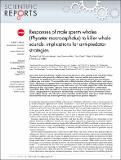Files in this item
Responses of male sperm whales (Physeter macrocephalus) to killer whale sounds : implications for anti-predator strategies
Item metadata
| dc.contributor.author | Cure, Charlotte | |
| dc.contributor.author | Antunes, Ricardo Nuno | |
| dc.contributor.author | Alves, Ana Catarina De Carvalho | |
| dc.contributor.author | Visser, Fleur | |
| dc.contributor.author | Kvadsheim, Petter H. | |
| dc.contributor.author | Miller, Patrick | |
| dc.date.accessioned | 2014-01-21T16:31:04Z | |
| dc.date.available | 2014-01-21T16:31:04Z | |
| dc.date.issued | 2013-04-02 | |
| dc.identifier | 73605124 | |
| dc.identifier | 742e8b02-ca94-4ea3-bc27-ea5a3d9a7caa | |
| dc.identifier | 000316953100004 | |
| dc.identifier | 84876568000 | |
| dc.identifier.citation | Cure , C , Antunes , R N , Alves , A C D C , Visser , F , Kvadsheim , P H & Miller , P 2013 , ' Responses of male sperm whales ( Physeter macrocephalus ) to killer whale sounds : implications for anti-predator strategies ' , Scientific Reports , vol. 3 , 1579 . https://doi.org/10.1038/srep01579 | en |
| dc.identifier.issn | 2045-2322 | |
| dc.identifier.uri | https://hdl.handle.net/10023/4410 | |
| dc.description.abstract | Interactions between individuals of different cetacean species are often observed in the wild. Killer whales (Orcinus orca) can be potential predators of many other cetaceans, and the interception of their vocalizations by unintended cetacean receivers may trigger anti-predator behavior that could mediate predator-prey interactions. We explored the anti-predator behaviour of five typically-solitary male sperm whales (Physeter macrocephalus) in the Norwegian Sea by playing sounds of mammal-feeding killer whales and monitoring behavioural responses using multi-sensor tags. Our results suggest that, rather than taking advantage of their large aerobic capacities to dive away from the perceived predator, sperm whales responded to killer whale playbacks by interrupting their foraging or resting dives and returning to the surface, changing their vocal production, and initiating a surprising degree of social behaviour in these mostly solitary animals. Thus, the interception of predator vocalizations by male sperm whales disrupted functional behaviours and mediated previously unrecognized anti-predator responses. | |
| dc.format.extent | 897024 | |
| dc.language.iso | eng | |
| dc.relation.ispartof | Scientific Reports | en |
| dc.subject | Behavioural ecology | en |
| dc.subject | Animal behaviour | en |
| dc.subject | QL Zoology | en |
| dc.subject.lcc | QL | en |
| dc.title | Responses of male sperm whales (Physeter macrocephalus) to killer whale sounds : implications for anti-predator strategies | en |
| dc.type | Journal article | en |
| dc.contributor.institution | University of St Andrews. School of Biology | en |
| dc.contributor.institution | University of St Andrews. Marine Alliance for Science & Technology Scotland | en |
| dc.contributor.institution | University of St Andrews. Scottish Oceans Institute | en |
| dc.contributor.institution | University of St Andrews. Institute of Behavioural and Neural Sciences | en |
| dc.contributor.institution | University of St Andrews. Centre for Social Learning & Cognitive Evolution | en |
| dc.contributor.institution | University of St Andrews. Bioacoustics group | en |
| dc.contributor.institution | University of St Andrews. Sea Mammal Research Unit | en |
| dc.identifier.doi | 10.1038/srep01579 | |
| dc.description.status | Peer reviewed | en |
This item appears in the following Collection(s)
Items in the St Andrews Research Repository are protected by copyright, with all rights reserved, unless otherwise indicated.

